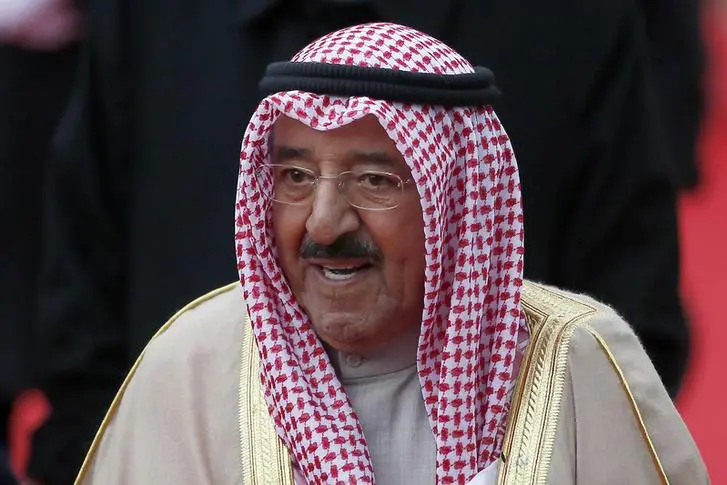PHOTO
DUBAI, Jan 20 (Reuters) - Kuwait's emir has called for better management of spending and for budget cuts to cope with declining revenues due to lower oil prices, state news agency KUNA said on Wednesday, in the second such call by the head of state since October.
The remarks by Sheikh Sabah al-Ahmed al-Sabah, at a meeting with newspaper editors, appeared part of a drive to prepare the ground for politically difficult economic measures such as cuts in energy and food price subsidies, which could occur next year.
"We are required to start with treatment and economic steps and programmes aimed at managing and reducing the budget articles, to deal with the shortages in the state financial revenues," Sheikh Sabah said, according to KUNA.
He added that any such measures must ensure that the basic needs of Kuwaitis were addressed.
The chief executive of state energy conglomerate Kuwait Petroleum Corp, Nizar al-Adsani, said on Tuesday that Kuwait was considering several options for energy subsidy reforms but any possible rise in domestic prices would not affect citizens' livelihoods.
Kuwait's parliament last July approved a state budget for the current fiscal year that began on April 1 that envisages a deficit of 8.18 billion dinars ($27.0 billion) - nearly half total spending - because of low oil prices.
The budget assumed an average oil price of $45 a barrel. Brent crude was trading at $27.75 on Wednesday.
A range of subsidy cuts is under consideration - local media reported in October that domestic gasoline prices might almost double, though they would remain among the lowest in the world - and the government has said it plans eventually to impose corporate tax on local firms.
Such changes could arouse complaints among the public and in parliament, which has often had tense relations with the cabinet that have slowed or blocked economic reforms. Kuwait's parliament is the most independent and assertive among the Gulf monarchies.
In October, Sheikh Sabah urged the cabinet and parliament to cut state spending in response to slumping oil prices, warning that any delay would increase the damage to the government's finances.
(Reporting by Ahmed Hagagy; Writing by Sami Aboudi; Editing by William Maclean and Alison Williams) ((sami.aboudi@thomsonreuters.com; +9715 6681 7277; Reuters Messaging: sami.aboudi.thomsonreuters.com@reuters.net))
Keywords: KUWAIT ECONOMY/EMIR
The remarks by Sheikh Sabah al-Ahmed al-Sabah, at a meeting with newspaper editors, appeared part of a drive to prepare the ground for politically difficult economic measures such as cuts in energy and food price subsidies, which could occur next year.
"We are required to start with treatment and economic steps and programmes aimed at managing and reducing the budget articles, to deal with the shortages in the state financial revenues," Sheikh Sabah said, according to KUNA.
He added that any such measures must ensure that the basic needs of Kuwaitis were addressed.
The chief executive of state energy conglomerate Kuwait Petroleum Corp, Nizar al-Adsani, said on Tuesday that Kuwait was considering several options for energy subsidy reforms but any possible rise in domestic prices would not affect citizens' livelihoods.
Kuwait's parliament last July approved a state budget for the current fiscal year that began on April 1 that envisages a deficit of 8.18 billion dinars ($27.0 billion) - nearly half total spending - because of low oil prices.
The budget assumed an average oil price of $45 a barrel. Brent crude was trading at $27.75 on Wednesday.
A range of subsidy cuts is under consideration - local media reported in October that domestic gasoline prices might almost double, though they would remain among the lowest in the world - and the government has said it plans eventually to impose corporate tax on local firms.
Such changes could arouse complaints among the public and in parliament, which has often had tense relations with the cabinet that have slowed or blocked economic reforms. Kuwait's parliament is the most independent and assertive among the Gulf monarchies.
In October, Sheikh Sabah urged the cabinet and parliament to cut state spending in response to slumping oil prices, warning that any delay would increase the damage to the government's finances.
(Reporting by Ahmed Hagagy; Writing by Sami Aboudi; Editing by William Maclean and Alison Williams) ((sami.aboudi@thomsonreuters.com; +9715 6681 7277; Reuters Messaging: sami.aboudi.thomsonreuters.com@reuters.net))
Keywords: KUWAIT ECONOMY/EMIR





















